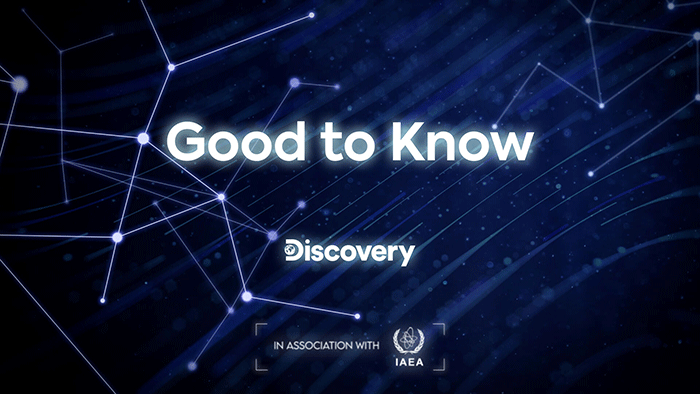Warner Bros. Discovery launches in partnership with IAEA: ‘Good To Know’, first nuclear science films on Discovery Channel
‘Good To Know’, a new educational videos series explaining how nuclear science can help solve global issues is being launched today on Discovery Channel, as part of a new partnership with the International Atomic Energy Agency (IAEA).
The films will air in over 30 countries, reaching 44 million households across the entire Europe, Middle East and Africa region.
This first tranche of five short films, made by the IAEA video team in conjunction with the Warner Bros. Discovery editorial team, will explain in simple terms how radiation can safely be used to solve some of the world’s most pressing global challenges. These include:
- Microplastics in the ocean (filmed in Monaco/Global)
- The growing cancer burden (filmed in India)
- Food insecurity (filmed in Austria/Global)
- Water scarcity in the face of climate change (filmed in Austria/Costa Rica)
- Industrial contamination (filmed in Czech Republic)
Each of these films is around one minute long and will play as part of Discovery’s ‘Good To Know’, a new educational videos series about the benefits of nuclear science and technology, both on television and online.
Future films to be included in the series will continue to investigate how nuclear science can help development, particularly in the light of climate change, such as by measuring how coastal regions sequester carbon, or how the oceans are becoming more acidic, or how pest insects can be controlled without chemicals, as well as more details on key IAEA programmes to battle plastic pollution, drought and hunger.
The films are made in conjunction with the twelve nuclear sciences and applications laboratories of the IAEA, a unique feature in the United Nations. The laboratories develop and share nuclear techniques with countries around the world. Watch a three-minute film about the labs here.
IAEA Director General Rafael Mariano Grossi said: “People may know us as the nuclear watchdog, helping enhance safety, security and safeguards in places like Fukushima, Iran, Ukraine. But not enough people know of the amazing potential nuclear science has to make tangible differences in people’s lives – helping farmers grow better crops, cancer patients get better treatment, governments understand and protect key natural areas. As the terrible effects of climate change become more obvious to people around the world, it is important for the public to also know there is hope. Science, as always, offers solutions to many of our main challenges.”
Najat Mokhtar, Head of IAEA Department of Nuclear Sciences and Applications, agreed: “I am delighted to see the vital research our labs are doing being shared on the respected Discovery Channel. Science is a vital force for good in the world, and nuclear science offers so many incredible innovations to help countries meet their development goals.”
Jamie Cooke, Executive Vice President and Managing Director Central Europe, Middle East and Turkey said: “We are thrilled that our viewers will now get the opportunity to learn more about how nuclear science is being used in innovative ways to improve our lives and advance the environmental sustainability agenda. We consider it our duty to leverage the voice, storytelling strength and expertise we have, to cast light and tell the right stories that will positively impact our communities and viewers. It’s part of our Social Good Strategy and we want to use our media for good.”


Comments are closed.